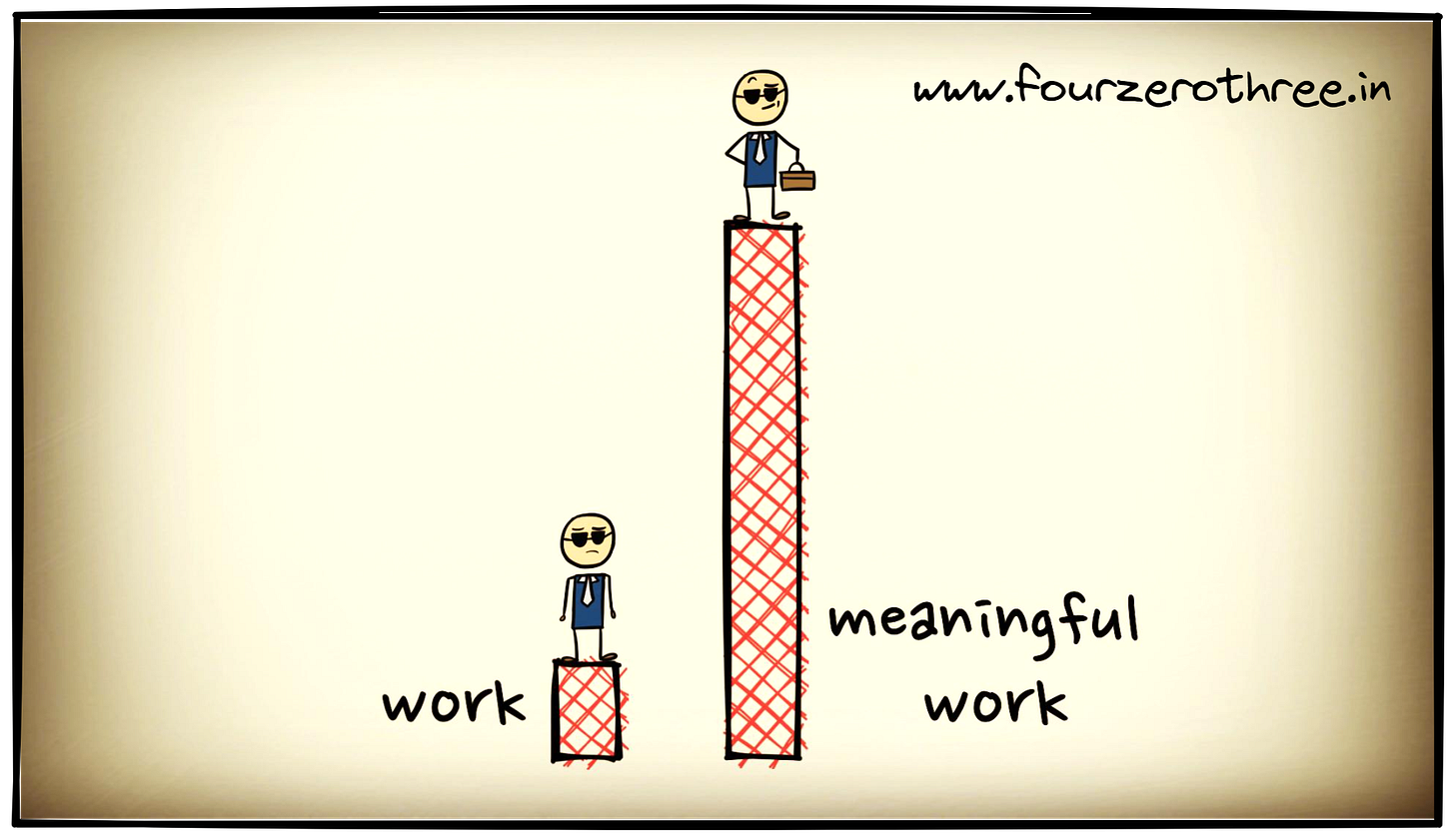Is Entrepreneurship a "Good Life"? Happiness, Meaning and Psychological Richness
Entrepreneurship is exciting and gives you freedom and recognition. But it's also hard, makes you anxious and want to give up. This ambivalence is weirdly enticing.
I am not romanticizing it. The brighter side of being self-employed has a heavy tint of survivorship bias. Entrepreneurship has its fair share of perks, but let’s get real and flip the coin. Things could get gloomy.
🎥FourZeroThree - YouTube
A quick shout out! Here's a “video version” of the article. If you are the visual type, I recommend watching the video. I bet you’ll enjoy it :)
The price you pay to be an entrepreneur
A particular downside of entrepreneurship, aspiring entrepreneurs often overlook is how lonely it can sometimes feel. Doing business has evolved, particularly with technology and the internet making it easier than before for people to start a business employing just themselves. Mark Leruste in his TED talk(1), says that 76% of 5.5 million businesses in the UK are single-person businesses. Running the operations of a business single-handedly can sometimes, despite the autonomy entrepreneurship offers, make it difficult to nurture and maintain relationships.
Being lonely is often not a choice. Entrepreneurs need money to get up and running. To make up for the lack of funds they may have to don many hats and do the work themselves. Entrepreneurs need to be “jack of all trades”.
A natural extension of this is overworking. To start and get a venture going would seem like a journey without a destination. Creating the website/app, creating a product, managing social media channels, doing e-mail marketing, making sales, handling finances and customer care, the needs for running a business would seem endless.
The amount of frustration, overwhelm and discomfort that an entrepreneur has to go through to learn something ridiculously new at regular intervals can be exhausting.
Being a jack of all trades often breeds imposter syndrome and this coupled with constant hustling with little for the haul in the immediate future, makes entrepreneurs feel uncertain, insecure, and anxious. The internal struggle is often the real deal.
An entrepreneur goes through all this for the long haul. It takes many years to build a stable business. Entrepreneurs probably won’t earn much in the first few months to a few years.
The stress that comes with overworking, little reward, overthinking, worrying and self-doubt takes a toll on mental health.
The allure of entrepreneurship - Happiness, Meaning and Psychological richness
Despite the odds stacked against a business and its owner, despite the vexation, wanting to commit to entrepreneurship is hauntingly alluring. Why? I caught myself asking this question. The hope of earning big bucks apart here is my speculation.
Oishi and Westgate(2) define a "good life" as
a life well lived from the perspective of the person living it.
Positive psychology has usually defined or explained a good life from the perspective of two dimensions - happiness and meaning. Oishi and Westgate argue that a life well lived could have a possible third dimension - “psychological richness”, a dimension that is distinct from happiness and meaning.
Everyone wants a good life. And maybe entrepreneurs, despite the pitfalls in their journey, taste all three dimensions of the good life.
Happiness (Hedonism)
Entrepreneurs paradoxically find happiness (hedonic well-being) in entrepreneurship despite the agony they undergo. Interestingly it is speculated that an entrepreneur’s self-satisfaction and seeming happiness may be a way of reducing cognitive dissonance to justify the enormous amount of time and resources spent on entrepreneurial ventures(3).
Meaning (Eudaemonism)
I think the most alluring nature of entrepreneurship is the meaning one derives from their work.
Most entrepreneurs may look at work as a “calling” rather than just a “job”. Autonomy at work helps entrepreneurs express their identity and gives them the flexibility of deciding how and when to work. Moreover, the work entrepreneurs do is determined by the skills they possess and shaped by their values which makes it deeply meaningful(4). Entrepreneurs may find eudemonic well-being in a) resilience and b) success in ventures that require much effort(3).
But here's the catch, though meaning and happiness could have a positive correlation (happiness may give meaning, meaning may give happiness), meaningful work could increase one's stress, worries, and anxieties(5) which could decrease one's happiness. Interesting isn't it?
Psychological Richness
For one seeking psychological richness, wanting pleasant experiences is not the goal. Rather it is the want of mental engagement and arousal. Experiences or situations offering psychological richness are those that, in a subjective sense, have an element of surprise, novelty, complexity and most importantly, those that are perspective-changing. Oishi and Westgate also predict that personal characteristics like having curiosity and an openness to experience contribute to psychological richness(2)(6).
Here’s the deal. At the end of the day, certain people want a psychologically rich life simply because it makes life all the more interesting, opposite the bore and mundanity of a routine, adding variety to life and keeping the person mentally engaged(2)(6).
Though I did not come across any paper or reports linking psychological richness and entrepreneurship, to me entrepreneurship feels psychologically rich.
Closing Notes
There are many motivations and incentives as to why one would want to be an entrepreneur. Economic or other material incentives apart, I wanted to ruminate as to why an entrepreneur could possibly want a life style that may often times be unpleasant and mentally taxing.
Resources and references
What they don't tell you about entrepreneurship - Mark Leruste
Lorraine L. Besser & Shigehiro Oishi. The psychologically rich life. Philosophical Psychology. 2020.





Lovely write-up, Sanketh! Well referenced to boot!!
Hope you're doing fine. TC 🙂